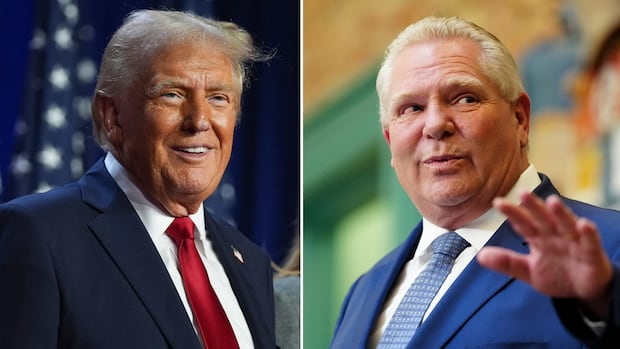The head of Canada’s largest province appears to be dipping his toe into new territory: talking about removing Mexico from the North American trade agreement.
As leaders across the continent weigh the implications of Donald Trump’s presidential election win, Ontario Premier Doug Ford issued a statement Tuesday.
He alluded to the likely difficult review ahead for the pact known in Canada as CUSMA (the Canada-United States-Mexico Agreement), which must be revised starting in 2026 or it will expire after a decade. Ford referred to one of the greatest challenges in that review: U.S. frustration with Chinese-owned car plants popping up in Mexico.
“Free trade needs to be fair,” Ford said in his statement.
“Since signing on to the United States-Mexico-Canada Agreement, Mexico has allowed itself to become a backdoor for Chinese cars, auto parts and other products into Canadian and American markets, putting Canadian and American workers’ livelihoods at risk while undermining our communities.”
Ford called for Mexico to place tariffs on Chinese imports to keep its car parts from the continental supply chain.
WATCH | Ford on trade with the U.S. after Trump win:
Following Donald Trump’s victory in the 2024 U.S. election, Premier Doug Ford says his government will try to fight any possible tariffs and continue to highlight to Trump’s team the close trade relationship that the U.S. has with Canada, and Ontario. CBC’s Lorenda Reddekopp has more.
And he added: “If Mexico won’t fight transshipment by, at the very least, matching Canadian and American tariffs on Chinese imports, they shouldn’t have a seat at the table or enjoy access to the largest economy in the world. Instead, we must prioritize the closest economic partnership on earth by directly negotiating a bilateral U.S.-Canada free trade agreement.”
Some of the most complex challenges in renewing the continent pact involve Mexico; they include economic issues orders of magnitude larger than U.S. qualms about Canadian dairy and digital taxes.
In addition to the proliferation of Chinese-owned car plants, Washington is also concerned about growing state influence over Mexico’s oil companies.
When asked recently about the idea of returning to a bilateral Canada-U.S.-only trade pact, a federal official told CBC News this is not Canada’s policy — at least not for now.
Booting Mexico from the pact would be opposed by large companies with business in all three countries.
It would also be met skeptically by some who view Mexico as a political ally when it comes to preserving U.S. congressional backing for North American trade.
The huge commercial flow across the Mexico-U.S. border, along with the enormous Mexican-American population, creates support for the pact from southern U.S. lawmakers, who have fewer connections to Canada.


